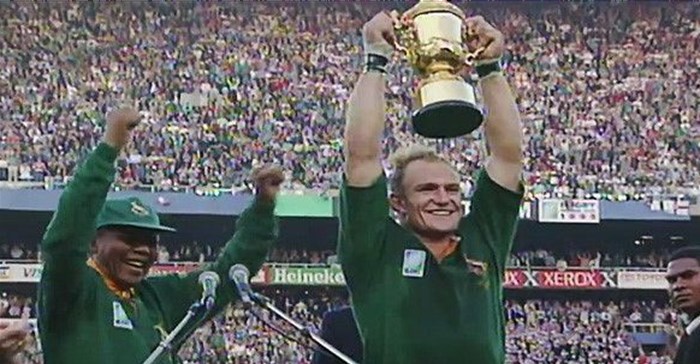As the outcome of the 2023 Rugby World Cup has made evident, the Springboks' legacy continues to thrive long after that iconic Madiba moment in 1995.

Source: © Rugby Dump
Rugby Dump That moment when Madiba donned the Springbok jersey at the 1995 Rugby World Cup final has been lauded as a masterclass for leaders says Parusha Partab, head of the IAB Africa Transformation (DEI) Council
Of all the brands that have boasted iconic status in South Africa, none will ever come close to that of Nelson Mandela.
The term ‘global icon’ is often bandied about, however, when it comes to Madiba, it is truly deserved.
The former president of South Africa’s brand continues to excel across all the dimensions to which many so desperately aspire; salience, meaningfulness, distinction, purpose.
It is difficult to find anyone in the country, or the world, who is unclear about what Mandela did, stood for and personally means to them.
Iconic brands transform
Of all his life’s great endurance and achievements, there is one moment that every South African of a certain age remembers vividly: Madiba donning the Springbok jersey at the 1995 Rugby World Cup final.
That moment has been lauded as a masterclass for leaders sitting on a powder keg, displaying the deftness of his communication skills and his foresight to promote national harmony and healing in a deeply fractured country.
He recognised that by embracing the predominantly white Springbok team and the sport of rugby, he could bridge the racial divide and unite the nation.
His unwavering support for the team and active involvement in the tournament proved to be immensely influential.
He not only transformed society but made it safe to forgive by setting a powerful example. He promoted inclusivity and recognised that diversity encompasses more than just representation.
Widely interpreted as a symbol of his outreach to the white community and his commitment to reconciliation, that singular moment exemplified much of what would become his life’s legacy: the lesson that all societal transformation begins with personal transformation.
Chasing the iconic dream
Effective creative expression and complex problem-solving require the incorporation of multiple perspectives, drawing from unique lived experiences, varied expertise and original thinking.
This is what Madiba’s act symbolised and what catapulted his brand to iconic status.
There is a famous book by Douglas B. Holt that lives on the shelves of many strategists. How Brands Become Icons: The Principles of Cultural Branding analyses how some brands move beyond merely representing businesses, products or services to become iconic symbols deeply embedded in — and often dictating — popular culture.
The central theme of the book revolves around the concept of ‘cultural branding’ and Holt argues that brands successful in this approach are those that transcend traditional marketing tactics to connect with consumers on a profoundly cultural level.
In other words iconic brands are not just commodities; they are a part of people’s lives and identities. They tap into broader cultural meanings, values and symbols, aligning themselves with larger cultural movements or narratives — just like Mandela, Apple or, locally, Nando’s.
It’s the dream of every contributor to brand creation or custodianship to have their brand become iconic, to tap into prevailing cultural norms and orthodoxies and offer alternative ideologies or identities, and to reconcile and heal societal fault lines by creating compelling brand narratives or myths that capture the imagination of communities of people and sometimes even entire countries.
In South Africa, the marketing industry has created many brands that have impacted the larger culture.
Famous campaigns have shifted and moved people, adding words and phrases to our lexicon and breaking barriers while shaping and being shaped by the larger socio-economic and political context.
Since the dawn of South Africa’s democracy, brands have played a crucial role in co-creating new cultural narratives, and inspiring innovative visions while simultaneously reflecting and stimulating political discourse.
Nothing constrains creativity: A fresh approach to an established brand
Over the past decade, the South African digital media and marketing landscape has experienced significant changes, largely driven by economic factors.
Prolonged periods of slow growth, recessionary cycles and the Covid-19 pandemic have led to reduced consumer spending and lower business confidence.
This, in turn, has impacted budgets for advertising and marketing.
At the Interactive Advertising Bureau (IAB) South Africa, which empowers the media and marketing industries to thrive in the digital economy, brands form an integral part of our community.
For the last 15 years, the organisation has worked to assist companies and the agencies whom they collaborate with to build powerful brands that live on in the lexicon of our culture.
Through the IAB South Africa’s various councils and committees, we provide insight and resources for brands to set the benchmark for innovation in digital media and marketing.
In particular, the mandate of the Transformation Council has been to embrace diversity and progress.
This and the notion of building a successful brand is the imperative behind the IAB South Africa and the Council’s objective to rebrand itself from the Transformation Council to the Diversity, Equity & Inclusion (DEI) Council.
This rebrand signifies a shift in focus towards fostering a more inclusive and equitable industry that celebrates diversity and champion’s progress.
By rebranding the Council, the IAB South Africa demonstrates a commitment to not only overcoming the challenges of slow growth, recessions, the impacts of the Covid-19 pandemic and lower business confidence but also driving positive change by promoting diverse perspectives and ensuring equal opportunities.
This marks progress for the Council itself as it now aligns with the organisation’s ultimate goal of transcending traditional marketing approaches to create iconic brands that resonate with people on a deeper cultural level and contribute to a more unified and progressive society.
Remembering our role in leadership
Advertising can be described as the fusion of creativity and commerce, where artistic expression serves economic progress.
In a nation like South Africa, it is increasingly vital for an industry driven by the pursuit of commercial expansion to rejuvenate and rise to the occasion.
Consumers frequently recount their experiences of slaving away to afford a car, motivated by an inspiring ad or marketing campaign.
They may reminisce about emotional or nostalgic moments evoked by a beer commercial or recognise the profound empowerment that comes from seeing their race, gender, sexual orientation or community represented in the media.
Although advertising is sometimes dismissed as merely producing visuals and occupying space, it plays a pivotal role in shaping our perceptions and the dreams we aspire to.
This presents both a noteworthy responsibility and opportunity for the industry to re-dedicate itself to exceptional creative work that benefits both the individuals it aims to influence and the brands it strives to develop.
It encourages viewing each brief as a chance to conceive an even more substantial and impactful ‘big idea’.
A clarion call
The Springboks’ legacy continues long after that iconic Madiba moment in 1995, as the team persists in inspiring and uniting the nation, showcasing increased diversity and serving as a powerful symbol of inclusion and transformation, there is much to learn from the Springboks in terms of harnessing a moment and building an iconic brand.
The media and marketing industries often face criticism for perpetuating harmful stereotypes, breaking promises and deceiving the unsuspecting.
However, when at its finest, it holds the power to create, to reconcile, to inspire.
Nelson Mandela once said, “I am not a saint unless you think of a saint as a sinner who keeps on trying”.
With this in mind, we as the rebranded IAB South Africa Diversity, Equity and Inclusion (DEI) Council strive to remember our capacity to lead, transform and captivate — and motivate other brands to do the same.
After all, these are the hallmarks of truly iconic brands.




















































